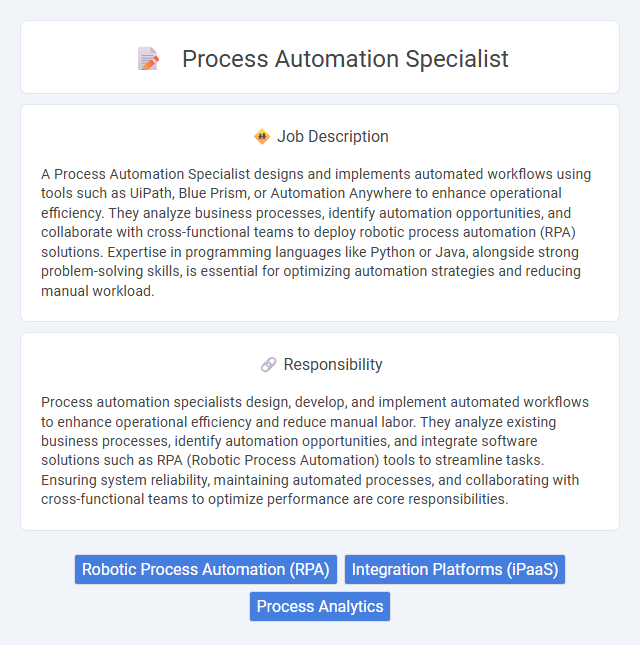
A Process Automation Specialist designs and implements automated workflows using tools such as UiPath, Blue Prism, or Automation Anywhere to enhance operational efficiency. They analyze business processes, identify automation opportunities, and collaborate with cross-functional teams to deploy robotic process automation (RPA) solutions. Expertise in programming languages like Python or Java, alongside strong problem-solving skills, is essential for optimizing automation strategies and reducing manual workload.
Individuals with strong analytical skills and a keen eye for detail are likely to thrive as Process Automation Specialists. Those who enjoy problem-solving and working with technology may find this role particularly suitable, as it often requires designing and optimizing automated workflows. However, candidates who prefer highly social or purely creative tasks might find the job less aligned with their strengths.
Qualification
A Process Automation Specialist typically requires expertise in programming languages such as Python, Java, or RPA tools like UiPath and Automation Anywhere. Strong analytical skills, proficiency in workflow design, and a thorough understanding of business process management systems are essential. Relevant certifications like Certified Automation Professional (CAP) or specific vendor certifications enhance job readiness and credibility.
Responsibility
Process automation specialists design, develop, and implement automated workflows to enhance operational efficiency and reduce manual labor. They analyze existing business processes, identify automation opportunities, and integrate software solutions such as RPA (Robotic Process Automation) tools to streamline tasks. Ensuring system reliability, maintaining automated processes, and collaborating with cross-functional teams to optimize performance are core responsibilities.
Benefit
Process automation specialists likely enhance operational efficiency by designing and implementing automated workflows, reducing manual tasks and minimizing errors. Companies may experience cost savings and increased productivity as automation streamlines repetitive processes and accelerates project timelines. Improved scalability and data accuracy might also result, allowing businesses to adapt quickly to changing demands.
Challenge
Process automation specialists likely face the challenge of integrating complex systems while ensuring minimal disruption to existing workflows. The need to stay updated with rapidly evolving automation technologies may create continuous learning demands. Managing cross-functional collaboration might also present obstacles in aligning diverse team priorities and technical requirements.
Career Advancement
Process automation specialists streamline complex workflows using advanced software and robotic tools, leading to increased organizational efficiency. Mastery of platforms like UiPath, Blue Prism, and Automation Anywhere enhances career prospects and opens pathways to senior roles such as automation architect or process improvement manager. Continuous upskilling in AI integration and data analytics boosts competitiveness and facilitates progression to leadership positions in digital transformation initiatives.
Key Terms
Robotic Process Automation (RPA)
A Process Automation Specialist focuses on designing, developing, and deploying Robotic Process Automation (RPA) solutions to enhance operational efficiency and reduce manual tasks. Expertise in RPA tools such as UiPath, Automation Anywhere, and Blue Prism is essential for creating scalable automation workflows. This role requires strong analytical skills to identify automation opportunities and optimize business processes across various departments.
Integration Platforms (iPaaS)
A Process Automation Specialist skilled in Integration Platforms as a Service (iPaaS) designs and manages seamless data workflows across cloud and on-premises applications to enhance operational efficiency. Utilizing tools like MuleSoft, Dell Boomi, and Microsoft Power Automate, they enable real-time integration, reducing manual tasks and accelerating business processes. Their expertise ensures scalable and secure connectivity, driving digital transformation and improving enterprise agility.
Process Analytics
Process automation specialists leverage process analytics to identify inefficiencies and optimize workflows using advanced tools like Robotic Process Automation (RPA) and Business Process Management (BPM). They analyze real-time data and performance metrics to design automation strategies that improve operational accuracy, reduce cycle times, and enhance productivity. Expertise in process mining and data visualization tools enables these specialists to deliver actionable insights that support continuous improvement and digital transformation initiatives.
 kuljobs.com
kuljobs.com